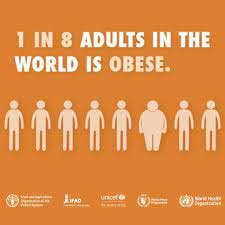
By Francis Allan L. Angelo
The global obesity crisis has reached a new high, with a study released by the Lancet in 2022 revealing that over 1 billion people worldwide are now living with obesity.
The findings show a disturbing trend with adult obesity rates more than doubling since 1990, and a fourfold increase among children and adolescents aged 5 to 19 years.
The data also indicate that nearly half of the adult population, 43%, was overweight in 2022.
Despite a decrease in undernutrition rates, it remains a significant public health challenge, especially in regions like South-East Asia and sub-Saharan Africa.
The study identified island nations in the Pacific and the Caribbean, along with countries in the Middle East and North Africa, as having the highest combined rates of underweight and obesity.
The World Health Organization (WHO) has played a pivotal role in collecting and analyzing data for this study, which is now accessible through the Global Health Observatory.
“This new study highlights the importance of preventing and managing obesity from early life to adulthood, through diet, physical activity, and adequate care, as needed,” emphasized Dr. Tedros Adhanom Ghebreyesus, WHO Director-General.
Dr. Tedros pointed out that meeting global targets to curb obesity requires a collective effort from governments, communities, and particularly the private sector, which needs to take responsibility for the health impacts of its products.
The WHO has outlined an Acceleration plan to stop obesity, adopted by the World Health Assembly in 2022, with 31 governments already spearheading the implementation of strategies to combat this epidemic by 2030.
These strategies include promoting healthy practices from birth, regulating harmful food and beverage marketing to children, implementing school nutrition policies, and integrating obesity prevention and management services into primary healthcare systems.
Dr. Francesco Branca, Director of WHO’s Nutrition and Food Safety Department and co-author of the study, stated, “There are significant challenges in implementing policies aimed at ensuring affordable access to healthy diets for all and creating environments that promote physical activity and overall healthy lifestyles for everyone.”
The study also sheds light on the persistent issue of malnutrition and its dire consequences, such as the high mortality rate among children under five.
Malnutrition encompasses a range of issues, from undernutrition to obesity, leading to life-threatening noncommunicable diseases like cardiovascular diseases, diabetes, and some cancers.
Addressing both obesity and undernutrition requires a multisectoral approach, involving not just health policies but also agriculture, social protection, and infrastructural developments to ensure food security, clean water, and sanitation for all.
The WHO urges countries to bolster their health systems with the integration of obesity prevention and management, underscoring the necessity of a united global response to a growing crisis that affects both individuals and health systems worldwide.























